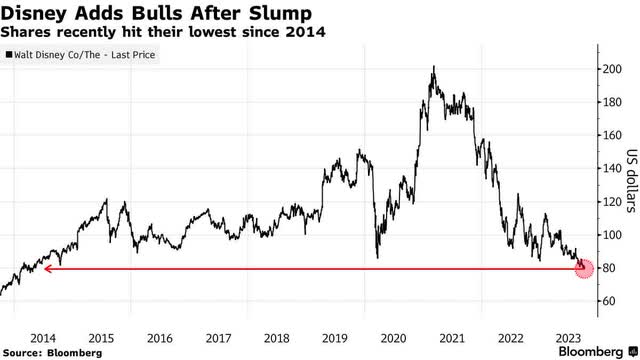Summary:
- The Walt Disney Company’s recovery plan is met with nostalgia and support from investors, but also raises questions about the company’s future initiatives.
- The success of Disney’s new content and revival of aging IP remains uncertain, as evidenced by the potential loss on “The Little Mermaid” film.
- The Q2 2024 earnings results may result in a small up or down movement in Disney’s shares, but investors should focus on the company’s hard-edged decisions rather than clichés.
CatLane/iStock Unreleased via Getty Images
Above: Mickey is 100 years old, but is his magic still magic?
DIS earnings release due in 12 days EPSE: $1.10-$1.19
Since the Bob Iger management’s proxy victory, a good chunk of the analyst community has given it something of a standing ovation. The rationale was essentially this: Now that the distraction of Nelson Peltz is gone, Iger and company can get back to uninterrupted execution of the recovery plan.
Above: The recent upside is at a crossroads until the 2Q24 earnings release.
Implied in that outcome was apparent support for the DIS initiatives aimed at bringing a new sparkle to the future of the company. Among the initiatives: Save over $7.5b in operating costs, cut film production budgets, invest $60b in Parks, turn D+ profitable, and staunch the bleeding of linear networks, push ESPN into sports betting.
Create dazzling new DIS content while reviving aging IP. The problem as we see it, as we have noted before, is that while these moves are on the plus side, they also seem to prompt as many questions as they answer.
When you look at the entire recovery plan, it still comes down to more of the same old same old. The abiding faith in DIS expressed in the proxy result had an implied nostalgia in the response of holders. They see DIS as the fortress of family entertainment it has been for decades. It was the same sweet memories of the old DIS that was that intruded into the DIS today that continues to keep the bullish flame burning.
Of course, DIS performance before the great covid/streaming disaster was indeed worthy of investor support when the bullish sentiment sent the stock brushing $200.
The DIS of today is frankly a new company compared to the DIS that once was. One of the stock’s greatest fans was Warren Buffett. In 1996, bemoaning that what he characterized as one of his dumbest ever decisions of his life was to sell his position in DIS in 1966, he explained that at the time he didn’t realize this:
It’s nice to be able to recycle Snow White and Mickey Mouse every seven years. You hit a different crowd. It’s like having an oil field when you pump all the oil and sell it again.”
(Note Mickey debuted in 1924.)
Surely, it is clear that 26 years ago, Warren was on target. The kids world of that year had, say, 8-year-olds who were born in 1958. Closer still were their parents, who were born in the 1930s. Even a generation before, the grand folks age, also young when Snow White was released in 1938. So that was the demo then, and what is the demo now? The question raised then is: If SW is so eternal, a piece of IP melded into history, why is its finished DEI version sitting on the shelf? And why isn’t DIS management uncertain about its reboot’s chances to gush barrels of pure crude into the DIS coffers? Its dependence on recycling was to prove wrong.
Released in 2023, The Little Mermaid has grossed a total of $569m, globally and U.S. The cost of the live action movie: $250m. My industry associates estimate that the flick would need $625m to break even. If the film has a tail, it might break even. But if it doesn’t, it looks like a loser. The audiences may be in a different place than what DIS believed when the film was green lit. The old saw here seems appropriate for the DIS executives who green lit TLM: Well, it seemed like a good idea at the time.
What this tells us then is that Warren’s comparison of a new Snow White oil well still pouring out gushers a day was true 26 years ago, but has become a stone loser today, perhaps? There’s much more at work here. DEI is a factor, but more so, the resonance of the IP visa vis-à-vis its legacy. Some legacy IP alluded to by Warren in 1994 appear to be closer to dry holes than gushers, with all due apologies to Warren.
What Mr. Market is looking for in 2Q24 from DIS matters in one sense but means little in the larger picture in others.
Consensus EPS call on DIS 2Q24:$1.10 T0 $1.18. This is not unrealistic against the 1Q22 $1.04 and 1Q23: 2Q23 $0.70. No great shakes, but face it, progress is progress. Revenues might continue flat or perhaps inching up from the flat number of Q223 of $235b. So the question before the house is this:
Whether we see a beat, a meet or a miss, in the real world of how Mr. Market will see those results there are these reactions to be culled from the pompom Disney twirlers who voted yes.
And I reverse those that see the path to recovery still missing. I suspect if a meet or beat occurs, we can see perhaps a single-digit upside move of investors who see upside ahead.
If we see a miss, prepare for some “I told you so” rhetoric. Megaphone phone in hand, we’re sure to hear from Peltz and very possibly a new visitation from the hungry hedgies that hug around among many same or others seeing a renewed proxy mess. DIS seems like a still-tempting situation.
A miss might trigger a single-digit dip that could see the stock trickle down into a range of $98 to $106 before goodies begin to rain down from a happy 3Q24 piñata. A slate of new flicks is due, DTC could well show hefty growth in subs, the summer parks season could have a healthy surge. Even an uptick in linear with the massive pouring of campaign money flooding the electorate can bring a positive tone to the stock.
But will all this be enough to bring the shares back to at least a $125 to $144 range, validating the positive echo that drove the proxy war Iger’s way? That’s another story. Trian Partners was defeated by mostly retail followers of the DIS secular religion. But the skeptics did not have a disastrous day either.
Now, let’s apprise Mr. Market’s response if DIS shows first, a small miss, then a worse case, a big one both in consensus EPS and revenue by segment. We’ll bypass a dive to the rabbit hole of a segment by segment analysis of each ZDI vertical. Instead, we look at trending health by segments since 4Q23 and 1Q24.
We see support levels short-term holding above $110 with some conviction. But what could be scary is subscriber departures above consensus linked to significant dip in Parks revenue trends that is a frontal attack on the DIS iron grip on arrival numbers that can be seen like the leading edge of inflation fatigue of a recession. And coming soon: an expansion of Universal theme parks, which will arrive with the old “must see.” Consumer curiosity driving enthusiastic new visitors.
Conclusion
DIS historically has been better than most in plumbing the depths of children’s psyches across decades. And most investors like Warren proceeded from the assumption that its wonderful IP had an eternal grasp on decade after decade of children. He was proved wrong. All he assumed was that kids remained the same DIS IP kids fans over 100 years.
The 2Q24 results could show we could be looking a modest up or down on the shares. From the early days of movie animation shorts, massive merchandising of product, TV network exposure, brilliant animated full-length films and, most of all, the dazzling insight that led Walt’s venture into theme parks to spin money forever globally. Even that key positioning must now be considered a target for the likes of Comcast (CMCSA) and other strong multi-platform competitors.
The point is for DIS holders to neither rejoice nor panic when the earnings call breaks, but instead consider if the company now has set in motion hard-edged decisions and not clichés.
Analyst’s Disclosure: I/we have no stock, option or similar derivative position in any of the companies mentioned, and no plans to initiate any such positions within the next 72 hours. I wrote this article myself, and it expresses my own opinions. I am not receiving compensation for it (other than from Seeking Alpha). I have no business relationship with any company whose stock is mentioned in this article.
Seeking Alpha’s Disclosure: Past performance is no guarantee of future results. No recommendation or advice is being given as to whether any investment is suitable for a particular investor. Any views or opinions expressed above may not reflect those of Seeking Alpha as a whole. Seeking Alpha is not a licensed securities dealer, broker or US investment adviser or investment bank. Our analysts are third party authors that include both professional investors and individual investors who may not be licensed or certified by any institute or regulatory body.
The House Edge is widely recognized as the only marketplace service on the casino/gaming/online sports betting sectors, researched, written and available to SA readers by Howard Jay Klein, a 30 year c-suite veteran of the gaming industry. His inside out information and on the ground know how benefits from this unique perspective and his network of friends, former associates and colleagues in the industry contribute to a viewpoint has consistently produced superior returns. The House Edge consistently outperforms many standard analyst guidance with top returns.
According to TipRanks, Klein rates among the top 100 gaming analysts out of a global total of 10,000.

